iPhone Original
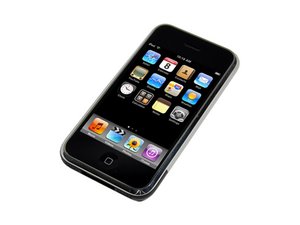
The iPhone 1st Generation was the first in the series of the revolutionary iPhone. The iPhone 1st Generation has a black front and a silver and black back. The side buttons are black and the head phones jack is recessed. The iPhone 1st Generation was first introduced with an 4GB and 8GB hard drive.
Specifications
Announce date: January 9, 2007
Model: A1203
Developer: Apple Inc.
Operating system: iPhone OS 1.0 through OS 3.1.3
Display:
- 3.5" multitouch
- 320x480 resolution at 163 ppi
- 2:3 aspect ratio
- 18-bit (262,144-color) LCD
Camera: 2.0 MP with geotagging
Processor: Apple-branded 412 MHz 32-bit Samsung ARM 11 with PowerVR MBX-Lite GPU
RAM: 128 MB eDRAM
Sensors: Accelerometer, Proximity, Ambient Light
Storage: 4, 8, or 16 GB Flash Memory
Wireless Connectivity:
- Wi-Fi (802.11b/g)
- Quad-band GSM/GPRS/EDGE (850 900 1,800 1,900 MHz)
- Bluetooth 2.0
Battery: 3.7 V, 1400 mAh lithium-ion polymer
Dimensions: 4.5 x 2.4 x 0.46 in (115 x 61 x 11.6 mm)
Weight: 135 g (4.8 oz)
Colors: Black
iPhone 3G

The iPhone 3G was the first iPhone to include 3G web surfing capabilities. The 8 GB iPhone 3G is completely black (front and back) with silver side buttons, while the 16 GB version offers a choice of black or white.
In terms of repairability, the iPhone 3G is not too bad. The display assembly comes off pretty easily with a suction cup and some plastic opening tools. The front glass can be replaced separately from the rest of the display assembly, saving money when replacing a shattered front panel. Since the phone is built from back to front, the rear panel is the hardest to replace and requires completely dismantling the entire device.
Specifications
Announce date: June 9, 2008
Model: A1241
Developer: Apple Inc.
Operating system: OS X 2.0 through iOS 4.2
Display:
- 3.5" (diagonal) widescreen Multi-Touch
- 320x480 resolution at 163 ppi
- 2:3 aspect ratio
- 18-bit (262,144-color) LCD
Camera: 2.0 MP with geotagging
Processor: Apple-branded 412 MHz 32-bit Samsung ARM 11 with PowerVR MBX-Lite GPU
RAM: 128 MB eDRAM
Sensors: Accelerometer, ambient light, two proximity sensors
Storage: 8, or 16 GB Flash Memory
Wireless Connectivity:
- Wi-Fi (802.11b/g)
- 3G (UMTS/HSDPA -- 850, 1900, 2100 MHz - 3.6 Mbps) and GSM/EDGE (850, 900, 1800, 1900 MHz)
- Bluetooth 2.0 + EDR
Battery: 3.7 V, 1150 mAh lithium-ion polymer
Dimensions: 4.5 x 2.4 x 0.48 in (115.5 x 62.1 x 12.3 mm)
Weight: 133 g (4.7 oz)
Colors: Black (8 GB or 16 GB) or White (16 GB only)
iPhone 3GS
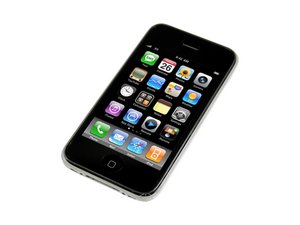
The iPhone 3GS was the first iPhone to include video recording capabilities. The iPhone 3GS has a black or white back, silver bezel and a black front. The iPhone 3GS was first introduced with 16GB and 32GB of flash memory.
Some parts are more difficult to repair than others. The display panel and front glass are relatively easy to repair, but getting to the battery or rear panel can take some time and effort. This is due to the design of the 3GS. It is built from the back to the front, so the further back a component is (think rear case), the harder it is to replace. One major plus with the 3GS is the ability to replace the front glass by itself as opposed to other iPhone models that require replacing the entire display assembly when your screen breaks.
Specifications
Announce date: June 8, 2009
Model: A1303
Developer: Apple Inc.
Operating system:
Display:
- 3.5" (diagonal) widescreen Multi-Touch with oleophobic coating
- 320x480 resolution at 163 ppi
- 2:3 aspect ratio
- 24-bit (16.76 million colors) LCD
Camera: 3.2 MP with geotagging and VGA video at 30 fps
Processor: 600 MHz ARM Cortex A8 with PowerVR SGX GPU
RAM: 256 MB eDRAM
Sensors:
- Gyroscope
- Accelerometer
- Proximity sensor
- Ambient light sensor
Storage: 8, 16, or 32 GB flash memory
Wireless Connectivity:
- Wi-Fi (802.11b/g)
- 3G (UMTS/HSDPA -- 850, 1900, 2100 MHz - 7.2 Mbps) and GSM/EDGE (850, 900, 1800, 1900 MHz)
- Bluetooth 2.0 + EDR
Battery: 3.7 V, 1220 mAh
Dimensions: 4.55 x 2.44 x 0.48 in (115.5 x 62.1 x 12.3 mm)
Weight: 135 g (4.8 oz)
Colors: Black (8/16/32 GB) or White (16/32 GB)
iPhone 4
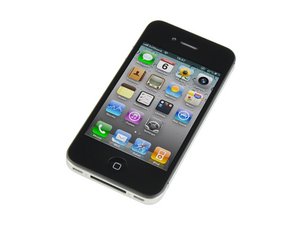
The iPhone 4 is the fourth iteration of Apple's cellphone line. Announced on June 7th, it is differentiated from earlier generations by having a squarish physical appearance, glass for both front and back panels, and a steel frame that doubles as reception antennas.
Difficulty with repairing the iPhone 4 depends on which part of the phone fails. The front panel glass is fused to the LCD and digitizer, which means that the glass can no longer be repaired or replaced individually. Users who accidentally shatter the iPhone 4's front panel will have to replace all three components (as a single unit) in order to successfully repair their iPhone 4. The back panel, however, is replaceable by unscrewing two screws and sliding up the panel.
Replacing the battery, on the other hand, is easily accomplished—even though Apple states that no parts within the iPhone 4 are user-serviceable. To replace the battery, the user can follow iFixit's battery replacement guide to remove the back panel and disconnect the battery.
Specifications
Announce date: June 07, 2010
'''Model:" A1332
Developer: http://www.apple.com
Operating System: iOS 4.0 through iOS 7.1.1
Display (Retina Display):
- 3.5 in (89 mm)
- 3:2 aspect ratio
- 960 x 640 px at 326 ppi
- 800:1 contrast ratio
- Scratch-Resistant, glossy, glass-covered IPS LCD screen
- Oleophobic coating
Camera: Contains both front and rear facing cameras.
- Front Camera
- .3 MP
- SD Video (480p) at 30fps
- Rear Camera
- 5MP
- HD Video (720p) at 30fps
- LED Flash
Processor: Apple A4 system-on-a-chip
RAM: 512 MB eDRAM
Storage: 8, 16, or 32 GB Flash Memory
Wireless Connectivity:
- Integrated 802.11n (2.4 GHz only)
- Bluetooth 2.1 + EDR
- Quad-band UMTS/HSDPA (850, 900, 1900, 2100 MHz) and GSM/EDGE (850, 900, 1800, 1900 MHz)
- 5.76 Mbit/s HSUPA
Battery: 3.7 V, 1,420 mAh
Dimensions: 4.5 × 2.31 × 0.37 in (115.2 × 58.6 × 9.3 mm)
Weight: 137 g (4.8 oz)
Colors: Black or White
iPhone 4 Verizon

Seven months after introducing the iPhone 4, Apple announced a CDMA version—the first Apple device capable of running on Verizon's cellular network.
Apart from the differences in wireless technology, the Verizon version of the iPhone 4 is essentially identical to the existing (GSM-spec) iPhone 4. Difficulty with repairing it depends on which part of the phone fails. The front panel glass is fused to the LCD and digitizer, which means that the glass can no longer be repaired or replaced individually. Users who accidentally shatter the iPhone 4's front panel will have to replace all three (as a single unit) in order to successfully repair their iPhone 4. The back panel, however, is replaceable by unscrewing two screws and sliding up the panel.
Replacing the battery, on the other hand, will be easily accomplished -- even though Apple ascertains that no parts within the iPhone 4 are user-serviceable. To replace the battery, the user can follow iFixit's battery replacement guide to remove the back panel and disconnect the battery.
Specifications
Announced On: January 11, 2011
Model: A1349
Developer: http://www.apple.com
Operating System: iOS 4.0 through iOS 7.1.1
Display (Retina Display):
- 3.5 in (89 mm)
- 3:2 aspect ratio
- 960 x 640 px at 326 ppi
- 800:1 contrast ratio
- Scratch-Resistant, glossy, glass-covered IPS LCD screen
- Oleophobic coating
Camera: Contains both front and rear facing cameras.
- Front Camera
- .3 MP
- SD Video (480p) at 30fps
- Rear Camera
- 5MP
- HD Video (720p) at 30fps
- LED Flash
Processor: Apple A4 system-on-a-chip
RAM: 512 MB eDRAM
Storage: 8, 16, or 32 GB Flash Memory
Wireless Connectivity:
- Integrated 802.11n (2.4 GHz only)
- Bluetooth 2.1 + EDR
- CDMA (EV-DO Rev. A, 800 MHz, 1900 MHz)
Battery: 3.7 V, 1,420 mAh
Dimensions: 4.5 × 2.31 × 0.37 in (115.2 × 58.6 × 9.3 mm)
Weight: 137 g (4.8 oz)
Colors: Black or White
iPhone 4s
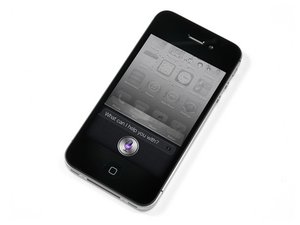
The iPhone 4S is Apple's 5th iteration of the iPhone. Announced on October 4th, 2011 at the Let's Talk iPhone event, the 4S shares the same body styling as its predecessor, the iPhone 4, but includes a series of software and hardware updates. It features both CDMA and GSM technology, making it a world phone; Apple's new A5 dual-core processor chip; an 8 megapixel camera with 1080p HD video capability; a new dual antenna system; Siri, a voice recognizing and talking assistant; and Bluetooth 4.0.
Specifications
Announce date: October 4, 2011
Model: A1387
Developer: http://www.apple.com
Operating System: iOS 5.0 and up
Display (Retina Display):
- 3.5 in (89 mm)
- 1.5:1 aspect ratio widescreen
- 960 x 640 px at 326 ppi
- 800:1 contrast ratio
- LED backlit IPS TFT LCD
Camera: Contains both front and rear facing cameras.
- Front Camera
- VGA (720p) at 30fps
- Rear Camera
- 8 MP
- HD Video (1080p) at 30fps
- LED Flash
- IR filter
- 5 element lens
- facial recognition / image stabilization
Processor: Apple A5 system-on-a-chip
RAM: 512MB DDR2
Sensors:
- Gyroscope
- Accelerometer
- Proximity sensor
- Ambient light sensor
Storage: 8, 16, 32, or 64 GB Flash Memory
Wireless Connectivity:
- Integrated 802.11 b/g/n (2.4 GHz only)
- Bluetooth 4.0
- Quad-band GSM/GPRS/EDGE (800 850 900 1800 1900 MHz)
- Quad-band UMTS/HSDPA/HSUPA (800 850 900 1900 2100 MHz) (800 MHz unannounced)
- Dual-band CDMA/EV-DO Rev. A (800 1900 MHz)
- GPS signal reception
Dimensions: 4.54 × 2.31 × 0.37 in (115.2 × 58.6 × 9.3 mm)
Weight: 140 g (4.9 oz)
Colors: Black or White
iPhone 5

The iPhone 5 is Apple's 6th iteration of the iPhone. Announced on September 12, 2012 at an apple event at the Yerba Buena Theater in San Francisco, the iPhone 5 improves on the body styling of the iPhone 4 line by increasing the screen size and reducing the weight and thickness of the device. The update also saw the inclusion of LTE cellular wireless networking, and the introduction of a new dock connector, Lightning.
It's easy to distinguish the iPhone 5 from previous models by its 4" Retina display, aluminum and glass rear panel, and all-new Lightning I/O connector. In addition, the iPhone's headphone jack was moved from the top to the bottom of the phone.
Specifications
Announce date: September 12, 2012
Model: A1428, A1429
Developer: http://www.apple.com
Operating System: iOS 6
Display (Retina Display):
- 4 in (102 mm)
- Multitouch widescreen
- 640 x 1136 pixel resolution at 326 ppi
- 800:1 contrast ratio
- LED backlit IPS TFT LCD
- Fingerprint resistant oleophobic coating on front
Camera: Contains both front and rear facing cameras.
- Front Camera
- Portrait photos at 1.2 MP
- VGA (720p) at 30fps
- Support for FaceTime over cellular wireless
- Rear Camera
- 8 MP
- HD Video (1080p) at 30fps
- LED Flash
- IR filter
- 5 element lens
- Facial recognition / image stabilization
- Panorama photo
- Photo while recording video
Processor: Apple A6
RAM: 1 GB DDR2
Storage: 16, 32, 64 GB Flash Memory
Wireless Connectivity:
- Integrated 802.11 a/b/g/n (Dual band 2.4 GHz and 5 GHz)
- Bluetooth 4.0
- GSM model A1428: UMTS/HSPA+/DC-HSDPA (850, 900, 1900, 2100 MHz); GSM/EDGE (850, 900, 1800, 1900 MHz); LTE (Bands 4 and 17)
- CDMA model A1429: CDMA EV-DO Rev. A and Rev. B (800, 1900, 2100 MHz); UMTS/HSPA+/DC-HSDPA (850, 900, 1900, 2100 MHz); GSM/EDGE (850, 900, 1800, 1900 MHz); LTE (Bands 1, 3, 5, 13, 25)
- GSM model A1429: UMTS/HSPA+/DC-HSDPA (850, 900, 1900, 2100 MHz); GSM/EDGE (850, 900, 1800, 1900 MHz); LTE (Bands 1, 3, 5)
- Digital Compass
- GPS and GLONASS signal reception
Battery: 3.8 V, 1440 mAh lithium-ion polymer
Dimensions: 4.87 × 2.31 × 0.30 in (123.8 × 58.6 × 7.6 mm)
Weight: 112 g (4.0 oz)
Colors: Black/Slate or White/Silver
iPhone 5c
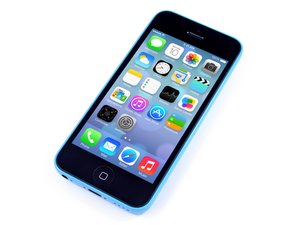
The iPhone 5c is a touchscreen-based smartphone developed by Apple Inc. It is one of two successors to the iPhone 5, along with its higher-end counterpart, the iPhone 5s.
Apple held an event to formally introduce the iPhone 5c and 5s on September 10, 2013. The iPhone 5c runs on the latest iteration of the iOS operating system, iOS 7, which was announced at the company's Apple Worldwide Developers Conference (WWDC) 2013.
The iPhone 5c was initially available with either 16 or 32 GB of on-board storage. In March of 2014, Apple introduced a low-cost, 8 GB configuration of the 5c in certain territories.
Specifications
Announce date: September 10, 2013
Model: A1532, A1456
Developer: Apple Inc.
Operating System: iOS 7
Display (Retina Display):
- 4 in (102 mm)
- Multitouch widescreen
- 640 x 1136 pixel resolution at 326 ppi
- 800:1 contrast ratio
- LED backlit IPS TFT LCD
- Fingerprint resistant oleophobic coating on front
Camera: Contains both front and rear facing cameras.
- Front Camera
- Portrait photos at 1.2 MP
- VGA (720p) at 30fps
- Support for FaceTime over cellular wireless
- Rear Camera
- 8 MP
- HD Video (1080p) at 30fps
- LED Flash
- IR filter
- 5 element lens
- Facial recognition / image stabilization
- Panorama photo
- Photo while recording video
Processor: Apple A6
RAM: 1 GB
Storage: 8, 16, 32 GB Flash Memory
Wireless Connectivity:
- Integrated 802.11 a/b/g/n (Dual band 2.4 GHz and 5 GHz)
- Bluetooth 4.0
- Digital Compass
- GPS and GLONASS signal reception
- GSM, CDMA, 3G, EVDO, HSPA+, LTE
Dimensions: 4.9 " x 2.33" x 0.35" (124.4 mm x 59.2 mm x 8.97 mm)
Weight: 4.65 oz (132 g)
Colors: Blue, green, pink, yellow, or white
iPhone 5s

The iPhone 5s is part of the iPhone line, succeeding the iPhone 5. Apple held an event to formally introduce the phone (and its mid-range counterpart, the iPhone 5c) on September 10, 2013.
Similar to the iPhone 4S, the 5s is a revised version of its predecessor, the iPhone 5, but also incorporates a 64-bit Apple A7 processor, a built-in fingerprint sensor on its updated home button, and runs on the iOS 7 operating system.
Specifications
Announce date: September 10, 2013
Model: A1533, A1453, A1457, A1528, A1530, A1518
Developer: Apple Inc.
Operating System: iOS 7
Display (Retina Display):
- 4 in (102 mm)
- Multitouch widescreen
- 640 x 1136 pixel resolution at 326 ppi
- 800:1 contrast ratio
- LED backlit IPS TFT LCD
- Fingerprint resistant oleophobic coating on front
Fingerprint reader: Touch ID fingerprint reader
Camera: Contains both front and rear facing cameras.
- Front Camera
- Portrait photos at 1.2 MP
- VGA (720p) at 30fps
- Support for FaceTime over cellular wireless
- Rear Camera
- 8 MP
- HD Video (1080p) at 30fps
- Dual warm/LED Flashes
- IR filter
- Facial recognition / image stabilization
- Panorama photo
- Photo while recording video
Processor: Apple A7
RAM: 1 GB LPDDR3 RAM
Storage: 16, 32, 64 GB Flash Memory
Wireless Connectivity:
- Integrated 802.11 a/b/g/n (Dual band 2.4 GHz and 5 GHz)
- Bluetooth 4.0
- GSM, CDMA, 3G, EVDO, HSPA+, LTE
- Digital Compass
- GPS and GLONASS signal reception
Dimensions: 4.87 × 2.31 × 0.30 in (123.8 × 58.6 × 7.6 mm)
Weight: 112 g (4.0 oz)
Colors: Space Gray, Silver, Gold


1 Comment
Should the description of the original iPhone really call the storage a "4GB or 8GB hard drive". It's flash storage.
Also, the display on the original iPhone show what I believe to be iOS 4. It shows a music note app instead of the iPod app for playing music. It's also missing a few default apps, such as SMS.
stewartlawrence - Reply